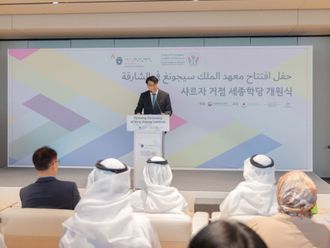Dubai: A key way to help boost the number of Emiratis working for the private sector is to keep channels of communication open between companies and higher educational institutions, the Visions2Reality conference heard on Wednesday.
Pointing out that 90 per cent of the 225,000 employed Emiratis in the UAE work in the public sector, Marwan Bin Jasem Al Sarkal, CEO of Sharjah Investment and Development Authority Shurooq, urged companies in the private sector and parents, schools and universities to work together to encourage students to study in fields that need new entrants.
“There are too many students graduating in banking, finance and marketing whereas there is a huge gap in architecture and media that we need to fill,” said Al Sarkal.
Ebrahim Mousa Jamal, Director of Operations for Tecom Investments Education Cluster, pointed out that while there was a large number of Emirati male students studying business, there was a bigger demand for jobs in logistics, tourism and the hospitality industry.
“There is a mismatch in what the students are studying and where the demand is,” he said.
Pointing out that Emiratis make up only 0.5 per cent of the total workforce in the private sector, Jamal said that students as young as those in Grade 10 should be told about the opportunities available in the private sector.
“Schools and universities should support innovation and entrepreneurship and spread awareness among students,” he added.
Challenges
With studies showing that 52 per cent of Emiratis attend internationally accredited universities as opposed to 48 per cent who attend government universities, Jamal said there was a need for a change.
“There needs to be a bigger shift in the number of Emiratis studying in international universities, so that they can interact and mingle with students from other nationalities and backgrounds — this will give them an open mind and they will be ready and more confident to work with expatriates in the workplace,” he said.
Suggesting that a quota of Emirati employees should be mandatory in multinational companies operating in the UAE, Al Sarkal pointed out that the lower salaries offered in the private sector was also a key reason putting off young job seekers from working in private companies.
“The public sector has higher salaries — the government should subsidise,” he said, adding the public sector cannot absorb all the new Emirati generation.
The conference at Dubai’s World Trade Centre also included a presentation by university students from the Sharjah Higher Colleges of Technology summarising the main challenges discouraging Emirati fresh graduates from searching for jobs in the private sector.
The challenges included job security, lower salaries, advancement and rewards, fewer holidays and more working hours. The students provided solutions to each of the challenges, highlighting the importance of a positive attitude, hard work and ambition, and underlining the opportunities of training and experience provided in private companies.
The forum was organised by the Department of Economic Development and Sharjah Islamic Bank.












